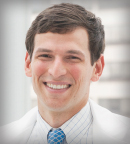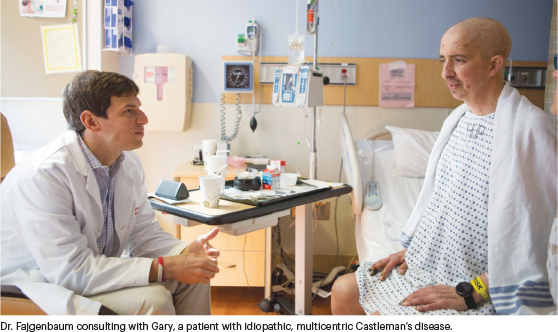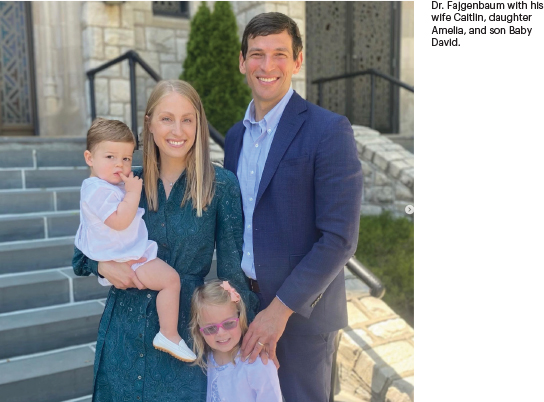Like many young boys, David Fajgenbaum, MD, MBA, MSc, loved sports and dreamed about playing college football. He attained that dream, but along the way, family tragedy and a personal battle with a life-threatening disease reshaped his worldview and accelerated his ambitions as a physician-scientist.
“I grew up in Raleigh, North Carolina. My parents immigrated from Trinidad, which is a fast-paced Caribbean environment, unlike Raleigh’s pretty slow-paced, traditional Southern style. “When I was a kid, football was all I could think about,” he said. “I was very close with my sisters and parents, especially my mother.”
DAVID FAJGENBAUM, MD, MBA, MSc

TITLE
Associate Professor in Translational Medicine and Human Genetics), University of Pennsylvania Perelman School of Medicine, and Founding Director, Center for Cytokine Storm Treatment and Laboratory, University of Pennsylvania, Philadelphia
President and Cofounder, Every Cure
MEDICAL DEGREEs
MD: University of Pennsylvania Perelman School of Medicine
MBA: Wharton School of Business, University of Pennsylvania
MSc: University of Oxford, UK
ON WHAT SIROLIMUS TREATMENT HAS DONE FOR HIM
“I went back to the lab to see if I could figure out something that could keep me in remission. And that’s when I discovered that a key part of the immune system—mTOR—was turned into overdrive, and the drug sirolimus turns mTOR off. I thought if I took an mTOR inhibitor, I could turn this off and stop disease progression. So, I started testing it on myself. January marked 10 years that I’ve been in remission on this drug. It’s amazing because when I started taking it, I was hopeful, but I was certainly not confident I’d be talking about 10 years later.”
From Football to Medicine
After a stellar football career at Ravenscroft High School, Dr. Fajgenbaum entered Georgetown University, where he attained his boyhood dream of playing college football, becoming the Hoya’s starting quarterback. However, his life’s trajectory would soon be altered, as his beloved mother developed glioblastoma at the beginning of his college career. As his mother was treated for brain cancer, his football career took a distant place in his life.
Bent on a career of deeper purpose, he decided to go into medicine and began his premed course work. According to Dr. Fajgenbaum, when his mother died of glioblastoma in 2004, his life’s purpose took on added weight; within a few weeks of her passing, he started an organization called Actively Moving Forward (AMF), in honor of his mother, Anne Marie Fajgenbaum.
“I started AMF for college students coping with the illness or death of a loved one, and that really became all-consuming for me. All I could think about was how do we reach more college students coping with the illness or death of a loved one, and how can I become a physician so I can try to prevent as much grief as possible through being an oncologist and a researcher? My mom becoming sick and then passing away changed everything for me,” he related.
A Life Interrupted
Prior to entering medical school, Dr. Fajgenbaum crossed the pond and received an MSc from the University of Oxford. His medical career path was going along at full speed at the Perelman School of Medicine at the University of Pennsylvania until his third year, when he noticed an odd sense of fatigue and abdominal pain.
Dr. Fajgenbaum explained: “I was on an OB-GYN rotation when I noticed some lumps in my neck. At the time, I didn’t know what all of it meant, but I just felt like I could put it off until after the rotation. I clearly knew something was going wrong, but after I took my medical school exam, I went down the hall to the emergency department, and they ran some blood tests. I’ll never forget the doctor coming in the room and saying, ‘David, your liver, your kidneys, your bone marrow, your heart, and your lungs are shutting down. We have to hospitalize you right away.’ And they did.”
Soon after being admitted as an inpatient, Dr. Fajgenbaum was transferred to the intensive care unit. “We had no idea what it was,” he continued. “It took 11 weeks to finally get the diagnosis. And during those 11 weeks, I started needing daily transfusions of red blood cells and platelets. I needed dialysis because my kidneys completely shut down. I drifted in and out of consciousness, unclear whether I would ever wake up, and it was absolutely frightening.”
He continued: “In fact, at the last possible moment, 11 weeks into this, I was read my last rites by a priest because the doctor said, ‘He’s not going to survive.’ So, I said goodbye to my family and my friends. They all marched in; I hugged them, and we cried. That was supposed to be it.”
Medical Mystery Solved
Dr. Fajgenbaum’s medical dilemma continued to baffle his doctors, who had painstakingly ruled out various blood disorders including lymphoma. He finally received a diagnosis of idiopathic, multicentric Castleman’s disease and began receiving regimens of chemotherapy, which ultimately saved his life. However, he knew chemotherapy was a reprieve, and the drugs would eventually stop working.
“I knew very little about Castleman’s disease, but at the time, I was relieved that it wasn’t lymphoma,” Dr. Fajgenbaum said. “My dad and sisters were incredibly supportive and never left my side. But one day, when they left the hospital room, I pulled out my phone and Googled Castleman’s disease. One study popped up that terrified me, noting about 80% of patients die within 2 years after diagnosis.”

According to Dr. Fajgenbaum, over a 7-month period, he spent about 6 months hospitalized. “I needed more and more chemotherapy because I kept relapsing,” he continued. “I was finally put on an experimental drug called siltuximab and was hopeful it would keep me in remission for a long time. I’d taken a year off on medical leave and returned to med school, hoping to continue on my path of becoming an oncologist and doing cancer research.”
However, after about 1 year on siltuximab, Dr. Fajgenbaum relapsed again. “Essentially, siltuximab had been my final hope. Naturally, I fell into a period of despondency, but after a while, I turned to my dad, my sisters, and my girlfriend at the time and told them I was going to dedicate the rest of my life—however long that might be—to trying to find treatments for this disease,” he said.
Realizing that he didn’t have the time or the financial resources to develop a new agent from the lab to the bedside, Dr. Fajgenbaum’s strategy would be to find a treatment for Castleman’s disease within the existing armamentarium.
A Man on a Mission
In May 2012, Dr. Fajgenbaum launched his scientific mission, working at breakneck pace. “When you have a deadly illness, you don’t really have time for all of the stars to align,” he shared. “So, I learned pretty quickly the most important thing I could do would be to try to align the stars. There was no one studying Castleman’s at Penn, but a researcher gave me some space in her lab. We put together a protocol and started doing experiments on my blood samples. I knew I was unlikely to make enough progress on my own, so I started an organization called the Castleman’s Disease Collaborative Network to try to get everyone to work together against this thing.”
Dr. Fajgenbaum continued: “I was engaged to Caitlin, and we were hoping to get married in May 2014, but then I relapsed. During that time, I was actually storing my own blood samples. I went back to the lab to see if I could figure out something that could keep me in remission. And that’s when I discovered a key part of the immune system—mTOR—had gone into overdrive, and the drug sirolimus turns mTOR off. I thought if I took an mTOR inhibitor, I could turn this off and stop disease progression. So, I started testing it on myself. January marked 10 years that I’ve been in remission on this drug. It’ s amazing because when I started taking it, I was hopeful, but I was certainly not confident I’d be talking about 10 years later.”
Joining Penn, Creating an NGO
In January 2014, Dr. Fajgenbaum joined the faculty of the University of Pennsylvania, serving as Associate Professor at the Perelman School of Medicine. He became a tenured professor at Penn Medicine and an awardee of multiple grants from the National Institutes of Health and the U.S. Food and Drug Administration.
Asked to describe the arc of his young career since joining the Penn faculty, Dr. Fajgenbaum shared these thoughts: “I joined Penn with the goal of continuing to find more uses for medicines for Castleman’s disease and for related diseases—what we call cytokine storm disorders, where the immune system gets out of control. To that end, I started a center called the Center for Cytokine Storm Treatment and Laboratory at Penn, where we studied that same drug in other patients with Castleman’s disease. To date, we’ve discovered and or advanced a total of 17 drugs for diseases they were not initially intended for, including the one that saved my life. That is really what the past 10 years have been all about—trying to unlock as many new treatments as possible.”

In 2022, to further the reach of his work, Dr. Fajgenbaum decided to partner with a close friend, Dr. Grant Mitchell, a leader in the field of artificial intelligence, with the hope they could combine their scientific and technologic skill sets into a drug-discovery venture. “At first, we thought about forming a company, but we soon realized the greatest need isn’t actually another pharmaceutical company. So, we launched a nonprofit organization called Every Cure, whose mission is to unlock the full potential of approved medicines to treat every disease they possibly can. Recently, we announced a partnership with a new federal agency—Advanced Research Projects Agency for Health (ARPA-H); over the next 3 years, ARPA-H will be giving us $48.3 million to supercharge our work. This is the kind of transformative funding you need to find more uses for medicines,” he said.
Advice and Decompression Time
When asked if he had any advice for young medical students, Dr. Fajgenbaum shared these comments: “It is super important to go through medicine with the humility of recognizing that our medical system has made incredible progress, but there’s still so much more work to be done. There are a lot of opportunities to make big progress, and you need to keep passionate about our role in that mission.”
Finally, when Dr. Fajgenbaum was asked how he decompresses from his super busy days, he stated: “I’ve got an amazing wife, Caitlin, and we have two great children, Amelia, age 5, and Baby David, age 2. If you ask Caitlin how I decompress, she’d probably tell you the truth: I don’t always decompress. I work really, really long hours because I’m so committed to what we’re doing, and it means everything to me. I’m literally alive because of a repurposed drug, so I sure as heck better pay back the universe by finding some more repurposed drugs for some other people. However, when I do decompress, it’s always with my family, spending quality time with my kids and my wife. That’s special time for me, and I probably could do a little bit more of it.”

